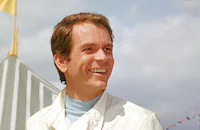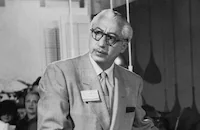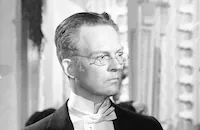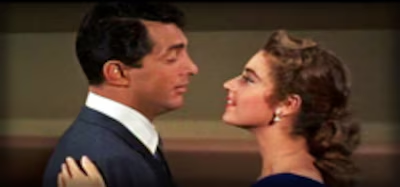Ten Thousand Bedrooms

Brief Synopsis
Cast & Crew
Richard Thorpe
Dean Martin
Anna Maria Alberghetti
Eva Bartok
Dewey Martin
Walter Slezak
Film Details
Technical Specs

Synopsis
When dapper hotel magnate Ray Hunter arrives in Rome to finalize the purchase of the Regent Hotel, he is met by a throng of reporters and the dignified Maria Martelli, who is in the service of the Regent's owner, Countess Alzani. After flirting with Maria during the drive, Ray arrives at the countess' mansion, where the elder matron immediately accuses the "bachelor with ten thousand bedrooms" of running his hotels like "assembly lines." After Ray assures her that he will retain her current employees, the countess closes the deal. During the drive back to the city, Maria mocks Ray about his "buying game." Instead of rebuking her, Ray appreciates her frankness, causing Maria to apologize by offering to be his translator that afternoon during staff introductions. When Maria stops briefly at her home, Ray meets Maria's youngest sister, the eighteen-year-old Nina, and her father Papa Vittorio. With her father accompanying her on piano, Nina sings Ray a romantic Italian number, brazenly flirting with the bachelor. Ray shows off his own musical talent singing the same song in English. Later, after a tour of the luxurious hotel, Ray invites Maria to dinner and whisks her onto the dance floor, where he serenades her. Soon after, Maria's suitor Anton, an impoverished Polish count and sculptor, joins them at their table and lavishes attention on Maria, who, he explains, is a sculptor with whom he shares his studio. After a disappointed Ray hastily leaves the couple, Anton insinuates that contact with the millionaire will help his own career. At the hotel, Ray's pilot Mike Clark notices sexy Nina, who works as the hotel stenographer, and is immediately smitten after a brief flirtation. Later in the evening, Nina attempts to seduce Ray in his room under the guise of offering dictation services. Succumbing to the young woman's advances, Ray takes her on a flying tour over Rome that evening, where he sings to her. Swooning from his attentions and the champagne, Nina falls into Ray's arms insisting that she wants to marry him. Ray returns with Nina to the Martelli home that evening to ask for her father's consent. Papa refuses, scolds Nina for her reckless behavior and explains to Ray that family tradition dictates that all the older sisters must marry before Nina is allowed to wed. Later, when Nina announces her engagement to Maria and sings a few bars of Ray's serenade, Maria bitterly comments that the fickle man has a "limited musical repertoire." Determined to overcome her father's objection, Ray calls company associates Tom Crandall and Bob Dudley in the United States and orders them to fly to Rome under the pretense of important business. Wanting to set a romantic tone for Tom and Bob's introduction to the remaining Martelli sisters, Diana and Anna, Ray requests that a grand party be held the following evening at the hotel. Meanwhile, Mike requests Nina's services in his room and dictates an autobiographical letter as a romantic ploy, but she shuns him. Now needing to marry off only Maria, Ray visits Anton's studio, where he buys an abstract sculpture for cash and commissions more for his hotels. Hours later, Anton excitedly reports his sales to Maria and proposes, but Maria refuses him, then goes to the hotel to tell Ray that she disapproves of his "instant marriages." Ray graciously apologizes, which prompts Maria to offer to dissuade her father from following the outdated family tradition. Ray is so overjoyed that he kisses her, leaving Maria speechless. Meanwhile, when the relentless Mike finds Nina at nearby café and professes his love, Nina reluctantly admits that she has feelings for him. At the party that night, Ray's plan appears to be working when he spots Bob and Tom happily dancing with Diana and Anna. When he discovers Maria has left early, Ray finds her at the studio, where she tells him that she resents his commissions as a way of buying her a husband and attaining Nina for himself. Although he admits his mistake, Maria continues to berate him. Ray impulsively embraces and kisses her, causing Maria to flee. Back at the party, Mike, knowing that Nina has yet to break up with Ray, drowns his disappointment with martinis and sends Nina away when she approaches him. In the ballroom, Papa, with a little encouragement from the romantic countess, announces Ray and Nina's engagement to the crowd. Much later in his hotel room, Ray admits to his valet Arthur that he is engaged to the wrong woman. When Arthur suggests they leave town, Ray complains that millionaires are not free from social constraints. Arthur chides that the "poor unhappy millionaire" should give his problems to his valet. Meanwhile, a despondent and confused Maria finally agrees to marry Anton. Early the next morning, after Bob and Tom announce to Ray that they have proposed to Diana and Anna, Anton reveals that Maria has accepted his proposal. Soon after, Mike reports that he is quitting because of his love for Ray's fiancée. Ray, sensing that the competition might resolve his dilemma, urges Mike to fight for Nina's hand. At the Martelli house, Anton, Bob and Tom parade into Papa's kitchen to ask for his daughters' hands in marriage. When Mike shows up moments later for Nina's hand, Papa demands an explanation from his daughters. While the women battle out the misunderstanding in Italian, Ray takes advantage of Anton's greed, offering him a job in Bombay that requires that he be bachelor, which Anton eagerly accepts. Days later the four sisters are married, Maria to Ray, Nina to Mike, Bob and Tom to Diana and Anna, while the countess and Papa debate on who finally decided to marry whom.

Director

Richard Thorpe
Cast

Dean Martin

Anna Maria Alberghetti

Eva Bartok

Dewey Martin

Walter Slezak

Paul Henreid

Jules Munshin

Evelyn Varden

Marcel Dalio
Lisa Montell

Lisa Gaye

John Archer
Steve Dunne

Dean Jones
Monique Van Vooren
Dori Simmons
Jeanne Baird

Wanda Mckay

Benny Rubin
Franco Corsaro
Bee Bolding
Henry Dar Boggia
Danny Truppi
Ernesto Morelli
Angelo Demeo
Jerry Martin

Nestor Paiva
June Di Maggio
Audrey Conti
Lilyan Chauvin

Don Dillaway
Francis Ravel
Sid Kane
Bob Argent
Ann Staunton
Manuel Paris
Saverio Lomedico
Dario Piazza
Jean Heremans
Richard Vitagliano
Frank Arnold
Frank Leyva
Leo Mostovoy
Gordon Morehouse
Frank Nechero
Valentin De Vargas
Renata Vanni
Mack Gray
Richard Alameda
Jean Hidey
Phyllis Graffeo
Crew
Irving Aaronson
Jack Baker
Nicholas Brodszky
Robert Bronner
Sammy Cahn
Art Cohn
Jimmy De Knight
Randall Duell
Giuseppe Fanciulli
Max C. Freedman
A. Arnold Gillespie
Sydney Guilaroff
Charles K. Hagedon
William A. Horning
Jack Lawrence
William Ludwig
Skip Martin
John Mcsweeney Jr.
Dr. Wesley C. Miller
Nisa
Joe Pasternak
Richard Pefferle
Helen Rose
Robert Saunders
Leonard Spigelgass
George Stoll
Robert Tucker
William Tuttle
Laslo Vadnay
Robert Van Eps
Betty Wand
Edwin B. Willis

Videos
Movie Clip


Trailer
Hosted Intro
Film Details
Technical Specs

Articles
Ten Thousand Bedrooms
Yet there was nothing wrong with the basic premise of Ten Thousand Bedrooms. A typically lavish "A" production from MGM, it told the story of a successful hotel mogul who decides to visit his new property in Rome. Once there he slips into playboy mode, romancing the four daughters of Italian papa Walter Slezak before pairing off with his favorite. In Dino: Living High in the Dirty Business of Dreams, biographer Nick Tosches wrote "Joe Pasternak, who had screen-tested and rejected Dean in 1946 and tried to sign him in 1948, was the film's producer. "We'll get the go-ahead signal after they've chosen a leading lady. It's sort of a satire on the Conrad Hilton hotel chain," Dean had told columnist Hy Gardner...I may sing one or two songs in it, but it's definitely not a musical."
But Ten Thousand Bedrooms certainly did spotlight Dino's crooning - "You I Love" and "Only Trust Your Heart" are among the songs - and the scenic beauty of Rome was another plus. For Martin, the film was practically a vacation and he brought his wife Jeannie along with him for the shoot (she was six months pregnant at the time). Martin's co-star in the film, Anna Maria Alberghetti (she would later star opposite Jerry Lewis in Cinderfella in 1960) "recalled the production as an easy one. She would remember Dean as most of those who acted with him in the years to come would also remember him: as a consummate professional, who knew not only all his own lines and cues but everyone else's as well, who at the same time overwhelmed the set with an air of artless, natural relaxation that turned work to pleasure." (from Dino by Nick Tosches).
Despite the middling box office receipts of Ten Thousand Bedrooms, most critics were kind to Martin in the reviews. Variety, for instance, deemed him "an affable leading man" for his solo effort and that he had "an easy way with a song." But it wasn't until his next feature, The Young Lions (1958), paired with Marlon Brando and Montgomery Clift, that Martin proved he had the potential to become a first class dramatic actor should he ever abandon his singing career.
Some additional trivia on Ten Thousand Bedrooms. Paul Henreid, who appears in the supporting cast, would go on to become a director of TV shows and movies, including Dead Ringer (1964) which featured his co-star from Now, Voyager (1942) - Bette Davis. Eva Bartok, cast in the role of Maria Martelli, would later star in the cult giallo thriller, Blood and Black Lace (1964), directed by Italy's renown horror director, Mario Bava.
Producer: Joe Pasternak
Director: Richard Thorpe
Screenplay: Laszlo Vadnay, Art Cohn, William Ludwig, Leonard Spigelgass
Cinematography: Robert J. Bronner
Film Editing: John McSweeney, Jr.
Music: George E. Stoll
Cast: Dean Martin (Ray Hunter), Anna Maria Alberghetti (Nina Martelli), Eva Bartok (Maria Martelli), Dewey Martin (Mike Clark), Walter Slezak (Papa Vittorio Martelli), Paul Henreid (Anton), Marcel Dalio (Vittorio Cisini), Dean Jones (Dan).
C-115m. Letterboxed. Closed captioning.
by Jeff Stafford

Ten Thousand Bedrooms
Quotes
Trivia
Notes
As the film opens, actress Monique Van Vooren lounges on an elaborately decorated bed and addresses the audience with the words, "Hello, you are about to see," while actor Dean Martin's voice can be heard singing "Ten Thousand Bedrooms." As noted in reviews, Ten Thousand Bedrooms was Dean Martin's first film after the dissolution of his partnership with comedian Jerry Lewis. From more information on the popular team, consult the above entry for the 1956 film Hollywood or Bust.
A July 28, 1955 Hollywood Reporter news item notes that Laslo Vadnay wrote the original story "10,000 Bedrooms," which M-G-M bought that year and subsequently assigned to Vadnay and Dwight Taylor to develop as a screenplay. Taylor's final contribution to the film is unknown. As noted in reviews, portions of the film were shot on location in Rome, Italy, including footage of the Colosseum, the Spanish Steps and the Trevi Fountain. A July 2, 1956 Los Angeles Times article states that Indian actress Anna Kashfi was to star in the film, but she was later replaced. According to a August 15, 1956 Hollywood Reporter news item, Joyce Taylor was cast in film; however, her appearance in the final film has not been confirmed.

Miscellaneous Notes
Released in United States Spring March 1956
Dean Martin's first film without Jerry Lewis.
CinemaScope
Released in United States Spring March 1956















